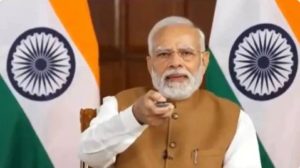
Prime Minister Narendra Modi launched 75 Digital Banking Units (DBUs) in 75 districts across the country to boost financial inclusion and simplify banking.
While dedicating these units to the nation, the Prime Minister said with such a banking setup, the government aims to provide maximum services with minimum infrastructure, and it will happen digitally without involving any paperwork.
“People living in small towns and villages will find benefits like transferring money to availing loans. DBUs are another big step in that direction which is going on in the country to make the life of common man of India easier,” he added.
What are DBUs?
The DBUs will enable people who do not have a personal computer, who do not have a laptop, or do not have even a smartphone, to be able to access banking services. They can do it digitally in a paperless mode.
Union Minister for Finance Nirmala Sitharaman pointed out that financial literacy can be promoted through these DBU units.
These units will be brick-and-mortar outlets. They will provide a host of digital banking facilities in a cost-effective and convenient way. The services they will offer include opening of savings accounts, balance-check, printing passbooks, transfer of funds, investment in fixed deposits, loan applications, stop-payment instructions for cheques issued, applications for credit and debit cards, tax and bill payment and nominations.
They units will enhance the digital experience of banking products and services. The DBUs are being set up to ensure that the benefits of digital banking reach every nook and corner of the country and cover all states and union territories.
As many as 11 banks in the public sector, 12 in the private sector and one Small Finance Bank are participating in setting them up.
How will DBUs operate?
The physical outlets will provide services in two modes. “Self-service mode will be available 24x7x365 days,” said Shaktikanta Das, Governor of Reserve Bank of India, in a virtual meeting. “The banks are also free to engage the services of digital business facilities and correspondence to expand the footprint of DBUs,” he said.
The units will also offer a digital assistance zone to answer queries from individuals and small businesses and hear their grievances, he pointed out.
The private banks which will set up DBUs include ICICI Bank and HDFC. The DBUs being set up by the ICICI Bank will reportedly have two distinct features – a Self-Service Zone and a Digital Assistance Zone. Customers will be able to access ATM, a Cash Deposit Machine (CDM) and a Multi-Functional Kiosk (MFK). They will be able to get passbook printed, deposit cheques and do internet banking at the Self-Service Zone. At Digital Assistance Zone, customers will be assisted to open various types of accounts.
At HDFC’s Self-Service Zone, the customers will be able to carry out transactions using Interactive ATMs, Cash Deposit Machines, Interactive Digital Walls, Net Banking Kiosks / Video calls and Tab Banking. Two bank staff will take care of the Digital Assistance Zone.
Different from traditional banking
DBUs are different from traditional banking in some ways. They will provide banking services, including cash deposit and withdrawal, 24 x 7. All the services shall be provided digitally. People not having connectivity or computing devices can do banking transactions from DBU in a paperless mode. Bank staff will be available to help and guide users for banking transactions in assisted mode. The units will also help in providing digital financial literacy and raise awareness for adopting digital banking.
Das said that DBUs will act as an enabler in the digital ecosystem and will improve customer experience by facilitating seamless banking transactions as also augment our efforts to promote financial inclusion by providing banking services in a paperless, efficient, safe and secure environment




 Driving Naari Programme launched in Chandigarh
Driving Naari Programme launched in Chandigarh






























